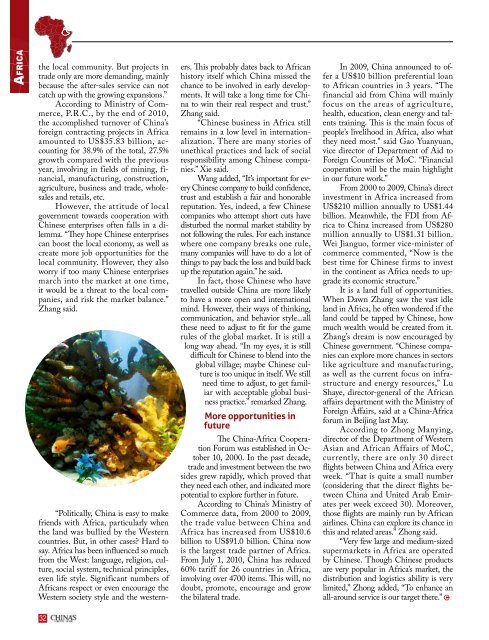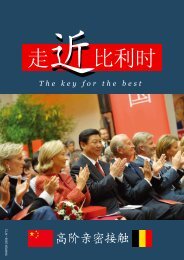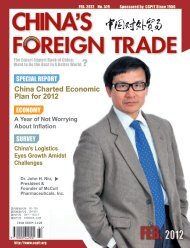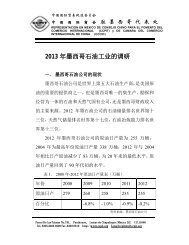Create successful ePaper yourself
Turn your PDF publications into a flip-book with our unique Google optimized e-Paper software.
Africa<br />
the local community. But projects in<br />
trade only are more demanding, mainly<br />
because the after-sales service can not<br />
catch up with the growing expansions.”<br />
According to Ministry of Commerce,<br />
P.R.C., by the end of 2010,<br />
the accomplished turnover of China’s<br />
foreign contracting projects in Africa<br />
amounted to US$35.83 billion, accounting<br />
for 38.9% of the total, 27.5%<br />
growth compared with the previous<br />
year, involving in fields of mining, financial,<br />
manufacturing, construction,<br />
agriculture, business and trade, wholesales<br />
and retails, etc.<br />
However, the attitude of local<br />
government towards cooperation with<br />
Chinese enterprises often falls in a dilemma.<br />
“They hope Chinese enterprises<br />
can boost the local economy, as well as<br />
create more job opportunities for the<br />
local community. However, they also<br />
worry if too many Chinese enterprises<br />
march into the market at one time,<br />
it would be a threat to the local companies,<br />
and risk the market balance.”<br />
Zhang said.<br />
“Politically, China is easy to make<br />
friends with Africa, particularly when<br />
the land was bullied by the Western<br />
countries. But, in other cases? Hard to<br />
say. Africa has been influenced so much<br />
from the West: language, religion, culture,<br />
social system, technical principles,<br />
even life style. Significant numbers of<br />
Africans respect or even encourage the<br />
Western society style and the westerners.<br />
This probably dates back to African<br />
history itself which China missed the<br />
chance to be involved in early developments.<br />
It will take a long time for China<br />
to win their real respect and trust.”<br />
Zhang said.<br />
“Chinese business in Africa still<br />
remains in a low level in internationalization.<br />
There are many stories of<br />
unethical practices and lack of social<br />
responsibility among Chinese companies.”<br />
Xie said.<br />
Wang added, “It’s important for every<br />
Chinese company to build confidence,<br />
trust and establish a fair and honorable<br />
reputation. Yes, indeed, a few Chinese<br />
companies who attempt short cuts have<br />
disturbed the normal market stability by<br />
not following the rules. For each instance<br />
where one company breaks one rule,<br />
many companies will have to do a lot of<br />
things to pay back the loss and build back<br />
up the reputation again.” he said.<br />
In fact, those Chinese who have<br />
travelled outside China are more likely<br />
to have a more open and international<br />
mind. However, their ways of thinking,<br />
communication, and behavior style...all<br />
these need to adjust to fit for the game<br />
rules of the global market. It is still a<br />
long way ahead. “In my eyes, it is still<br />
difficult for Chinese to blend into the<br />
global village; maybe Chinese culture<br />
is too unique in itself. We still<br />
need time to adjust, to get familiar<br />
with acceptable global business<br />
practice.” remarked Zhang.<br />
More opportunities in<br />
future<br />
The China-Africa Cooperation<br />
Forum was established in October<br />
10, 2000. In the past decade,<br />
trade and investment between the two<br />
sides grew rapidly, which proved that<br />
they need each other, and indicated more<br />
potential to explore further in future.<br />
According to China’s Ministry of<br />
Commerce data, from 2000 to 2009,<br />
the trade value between China and<br />
Africa has increased from US$10.6<br />
billion to US$91.0 billion. China now<br />
is the largest trade partner of Africa.<br />
From July 1, 2010, China has reduced<br />
60% tariff for 26 countries in Africa,<br />
involving over 4700 items. This will, no<br />
doubt, promote, encourage and grow<br />
the bilateral trade.<br />
In 2009, China announced to offer<br />
a US$10 billion preferential loan<br />
to African countries in 3 years. “The<br />
financial aid from China will mainly<br />
focus on the areas of agriculture,<br />
health, education, clean energy and talents<br />
training. This is the main focus of<br />
people’s livelihood in Africa, also what<br />
they need most.” said Gao Yuanyuan,<br />
vice director of Department of Aid to<br />
Foreign Countries of MoC. “Financial<br />
cooperation will be the main highlight<br />
in our future work.”<br />
From 2000 to 2009, China’s direct<br />
investment in Africa increased from<br />
US$210 million annually to US$1.44<br />
billion. Meanwhile, the FDI from Africa<br />
to China increased from US$280<br />
million annually to US$1.31 billion.<br />
Wei Jianguo, former vice-minister of<br />
commerce commented, “Now is the<br />
best time for Chinese firms to invest<br />
in the continent as Africa needs to upgrade<br />
its economic structure.”<br />
It is a land full of opportunities.<br />
When Dawn Zhang saw the vast idle<br />
land in Africa, he often wondered if the<br />
land could be tapped by Chinese, how<br />
much wealth would be created from it.<br />
Zhang’s dream is now encouraged by<br />
Chinese government. “Chinese companies<br />
can explore more chances in sectors<br />
like agriculture and manufacturing,<br />
as well as the current focus on infrastructure<br />
and energy resources,” Lu<br />
Shaye, director-general of the African<br />
affairs department with the Ministry of<br />
Foreign Affairs, said at a China-Africa<br />
forum in Beijing last May.<br />
According to Zhong Manying,<br />
director of the Department of Western<br />
Asian and African Affairs of MoC,<br />
currently, there are only 30 direct<br />
flights between China and Africa every<br />
week. “That is quite a small number<br />
(considering that the direct flights between<br />
China and United Arab Emirates<br />
per week exceed 30). Moreover,<br />
those flights are mainly run by African<br />
airlines. China can explore its chance in<br />
this and related areas.” Zhong said.<br />
“Very few large and medium-sized<br />
supermarkets in Africa are operated<br />
by Chinese. Though Chinese products<br />
are very popular in Africa’s market, the<br />
distribution and logistics ability is very<br />
limited,” Zhong added, “To enhance an<br />
all-around service is our target there.”<br />
32

















